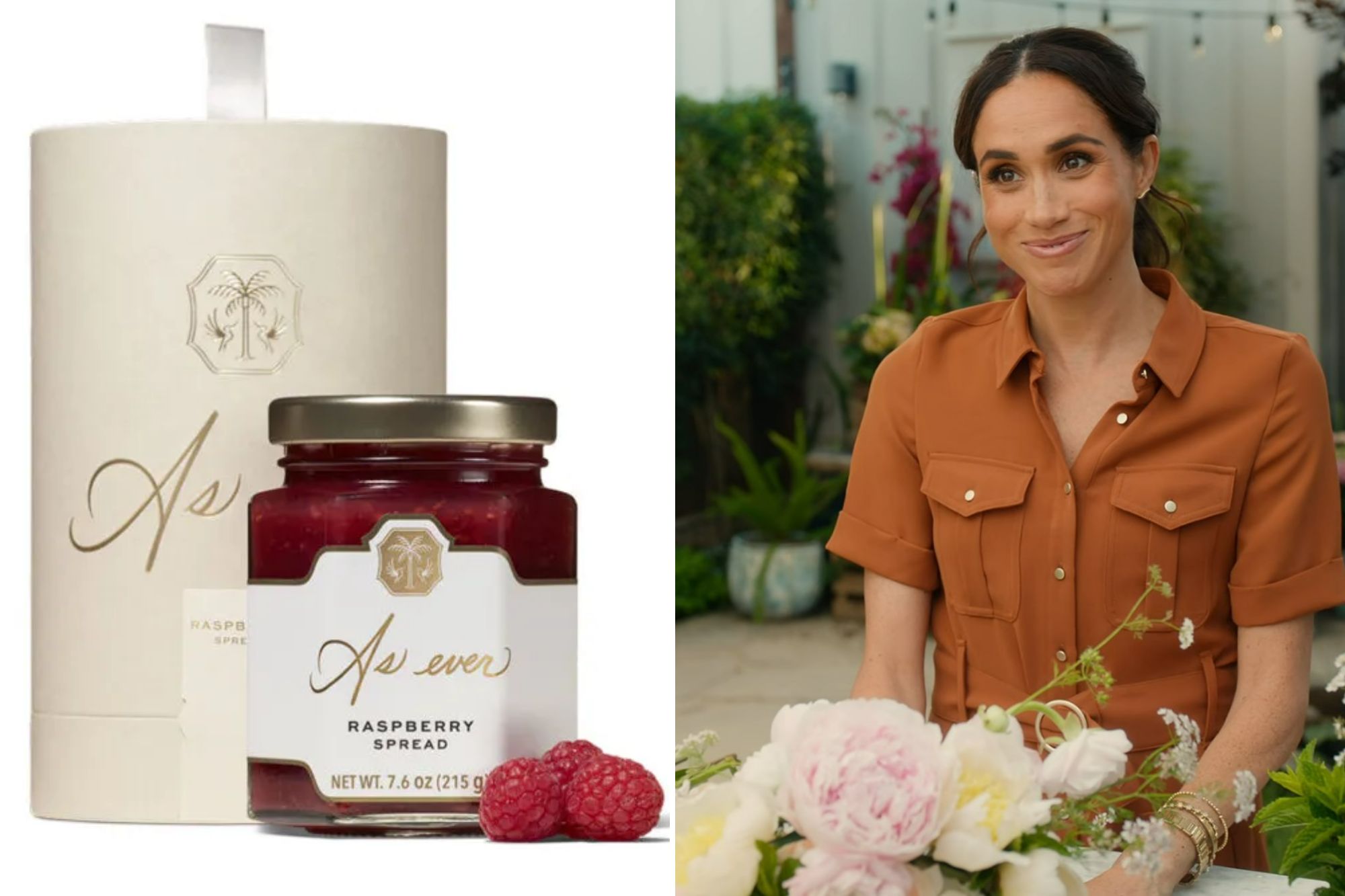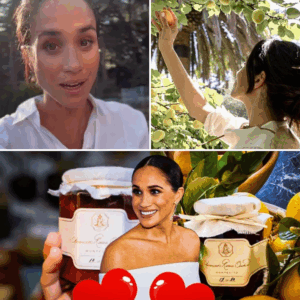Oh, the audacity of a royal rebrand! When Meghan Markle, the Duchess of Sussex, launched her lifestyle brand As Ever, the world was promised a taste of her personal touch—a jar of raspberry jam so authentic, so lovingly crafted, it was practically kissed by her own hands in her Montecito kitchen. The marketing was a masterclass in warm fuzzies: “Inspired by Meghan’s own recipes,” the press releases cooed, conjuring images of the Duchess elbow-deep in berries, stirring a pot with a wooden spoon, maybe even wiping a smudge of jam off her cheek with a designer apron. But hold the crown—because the truth is far less picturesque. That “homemade” jam? It’s churned out by a factory in Illinois, far from Meghan’s sun-dappled California estate. So, is this a case of culinary plagiarism, a slick deception for profit, or just another day in the life of a celebrity brand? Let’s dive into the sticky mess and find out.
The Royal Jam Jamboree
When As Ever hit the virtual shelves, it wasn’t just a product launch—it was an event. The brand, touted as a celebration of Meghan’s love for cooking and hosting, promised a curated collection of goods that screamed “everyday elegance.” The star of the show? A $14 jar of raspberry jam, described as a labor of love, rooted in Meghan’s personal recipe. Fans swooned, skeptics raised an eyebrow, and within an hour, the entire stock sold out. Social media lit up with praise from devotees and complaints from those who missed out, all while Meghan’s Instagram post gushed about her “heart overflowing with joy” at the sellout success. The narrative was clear: this was Meghan’s jam, made with her soul, her story, her very essence.

But then, like a pesky fruit fly in the jam jar, the truth buzzed in. The “homemade” raspberry jam wasn’t whipped up in Meghan’s kitchen or even in a quaint artisanal workshop. No, it was produced by a large-scale food manufacturer in Illinois, a state better known for cornfields than royal recipes. The revelation sparked a firestorm online, with critics crying foul and fans scrambling to defend their Duchess. Was this a deliberate attempt to mislead consumers, or just a misunderstanding blown out of proportion? The answer lies in the fine print—and the fine art of celebrity branding.
A Recipe for Deception?
Let’s start with the marketing. As Ever’s campaign leaned heavily on Meghan’s personal connection to the products. The jam, in particular, was framed as a slice of her life, a nod to the jars she’d gifted to friends and family. The implication was clear: buy this jam, and you’re getting a taste of Meghan’s world. It’s a classic celebrity playbook—slap a famous name on a product, sprinkle in some personal anecdotes, and watch the dollars roll in. But when the product in question is made in a factory, not a kitchen, the “personal touch” starts to feel more like a personal slight.
The Illinois manufacturer, while undoubtedly skilled at mass-producing jams, isn’t exactly the stuff of royal fantasy. Picture conveyor belts, industrial vats, and workers in hairnets—not quite the Montecito dreamscape Meghan’s team painted. The disconnect between the marketing and the reality raises a thorny question: did Meghan and her team knowingly oversell the “homemade” angle to boost sales? Or is this just a case of sloppy branding, where the desire to craft a compelling story outstripped the truth?
To be fair, Meghan isn’t the first celebrity to face this kind of backlash. Celebrity-branded products often walk a fine line between authenticity and exaggeration. Gwyneth Paltrow’s Goop has been criticized for peddling overpriced wellness nonsense, and countless stars have slapped their names on wines, perfumes, and foods that they had little hand in creating. But Meghan’s case stings more because of the specific narrative she chose. By emphasizing the jam’s roots in her own kitchen, she invited scrutiny—and boy, did she get it.
Plagiarism or Just Business as Usual?
Now, let’s tackle the plagiarism angle. Could Meghan’s jam be a rip-off of someone else’s recipe? The short answer: probably not. Raspberry jam isn’t exactly a culinary frontier; it’s a staple that’s been around for centuries. Recipes vary little—berries, sugar, maybe a splash of lemon juice or pectin. Unless Meghan’s team lifted a specific, proprietary formula from another brand (and there’s no evidence of that), the plagiarism charge doesn’t hold much water. What’s more likely is that the recipe was tweaked by the Illinois manufacturer to meet commercial standards, with Meghan’s input being more inspirational than instructional.

But the lack of outright plagiarism doesn’t let Meghan off the hook. The real issue here is the gap between expectation and reality. Consumers who shelled out $14 for a jar of jam were buying into a story—a story that turned out to be, at best, embellished. At worst, it’s a calculated move to exploit Meghan’s fame for profit. The sellout success of As Ever’s launch suggests that scarcity marketing played a role, too. By releasing a limited quantity, the brand created a frenzy, driving demand through the roof. It’s a tried-and-true tactic, but when paired with the “homemade” narrative, it feels manipulative.
The Illinois Connection
So, why Illinois? The choice of a Midwestern manufacturer makes sense from a logistical standpoint. Illinois has a robust food production industry, with facilities equipped to handle large-scale orders and meet strict safety standards. For a brand like As Ever, which aims to scale quickly, partnering with an established manufacturer is a no-brainer. The problem isn’t the factory itself—it’s the failure to be upfront about it. Had Meghan’s team said, “We’ve partnered with a top-tier producer to bring my vision to life,” the backlash might have been muted. Instead, they let the “homemade” myth fester, and now they’re paying the price.
The factory revelation also raises questions about the jam’s quality. Is it truly premium, as the $14 price tag suggests, or is it just standard jam dressed up in royal packaging? Without tasting it ourselves, we can only speculate, but the Illinois connection suggests a product designed for mass appeal rather than artisanal excellence. And that’s fine—unless you’re charging a premium and claiming it’s straight from the Duchess’s kitchen.
The Social Media Storm
As with any Meghan-related controversy, social media has been a battleground. Critics have pounced, accusing her of everything from dishonesty to hypocrisy. “She’s selling factory jam and calling it homemade? Typical Meghan,” one X user snarked. Others have pointed out the irony of a former royal, who once railed against the establishment, using classic corporate tactics to build her empire. Meanwhile, her fans have rallied to her defense, arguing that the backlash is overblown. “It’s just jam, people! Let her live,” one supporter tweeted.
The debate has also spilled into broader discussions about celebrity branding and consumer trust. In an era where authenticity is currency, Meghan’s misstep feels like a betrayal to some. Others see it as par for the course—a reminder that celebrity products are often more about image than substance. Either way, the controversy has kept As Ever in the headlines, which might just be the point.
What’s Next for As Ever?
So, where does Meghan go from here? The smart move would be to address the controversy head-on. A candid Instagram post or interview, acknowledging the factory production while emphasizing her creative input, could defuse the tension. Transparency is the best antidote to accusations of deception, and Meghan’s knack for storytelling could turn this into a redemption arc. Alternatively, she could double down on the luxury angle, repositioning As Ever as a high-end brand rather than a homespun passion project. Either way, she’ll need to tread carefully to avoid alienating her fanbase.
As for the jam itself, it’s unlikely to disappear. The sellout success proves there’s demand, and Meghan’s star power ensures that As Ever will keep drawing attention. Future launches—rumored to include teas, crepe mixes, and cookies—will likely face similar scrutiny, but they’ll also benefit from the buzz. In the world of celebrity branding, controversy isn’t always a bad thing; sometimes, it’s just free advertising.
The Bigger Picture
At its core, the As Ever jam saga is a case study in the perils of overpromising. Meghan’s team bet big on the “homemade” narrative, hoping to tap into her relatable, down-to-earth image. But in doing so, they underestimated the public’s appetite for authenticity—and their willingness to call out discrepancies. The result is a PR hiccup that’s equal parts embarrassing and illuminating.
Is Meghan a villain in this story? Hardly. She’s a savvy businesswoman navigating a cutthroat industry, and missteps are part of the game. But the jam controversy is a reminder that even the most polished brands can’t outrun the truth. Whether it’s a royal recipe or a factory formula, consumers want honesty—and they’ll raise hell when they don’t get it.
So, the next time you’re tempted to drop $14 on a jar of celebrity jam, take a moment to read the label. You might just find that the “royal touch” is more of a royal stretch. And as for Meghan? She’ll keep stirring the pot, one way or another—because that’s what makes her, well, Meghan.




